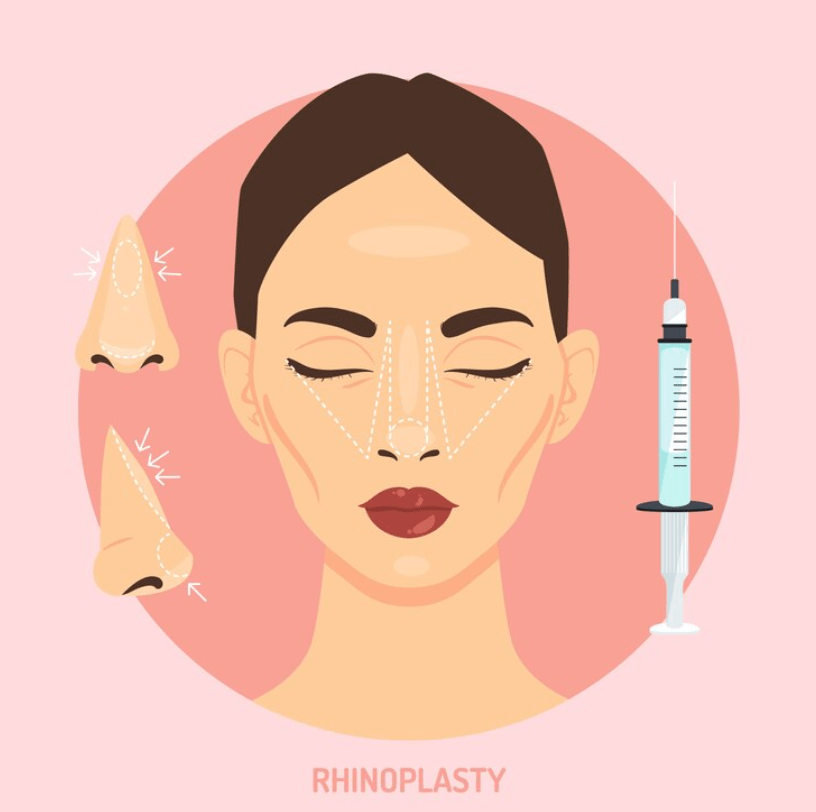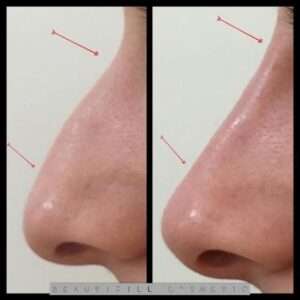What is rhinoplasty?
- Dr Maryum Sohail
- March 8, 2024
- 9:36 pm

Finding a nose line of work, or rhinoplasty, isn’t just about further developing how your nose looks; it’s a blend of restorative upgrades and resolving any breathing issues connected to defective nasal construction.
Does my child require rhinoplasty?
Deciding that your child needs rhinoplasty is essential to improving their daily life experiences. It might be crucial if your child has;
● Nasal birth defects
● Trouble breathing
● They are dissatisfied or feel insecure about how their nose looks.
● Your child’s surgeon will examine their overall health and age and determine why they want the surgery.
What should I know about the nose job?
● When you decide, the surgeon may require a detailed medical history of your child, including any past surgeries, current medications, allergies, and any history of nose blockage or breathing difficulties.
● Your doctor will thoroughly examine the nose inside and out. This is done to identify any issues that cause breathing problems or cosmetic abnormalities.
● They will check the facial structure for balanced Rhinoplasty results. They may also take photographs of the nose from various angles to study and thoroughly plan the procedure, communicate expectations, and evaluate postoperative results.
● It is also essential to discuss any family history of bleeding disorders or reactions to anesthesia during surgery, as these could impact the child during the surgery or recovery process.
● The child might meet with an anesthesiologist to check if the anesthesia is safe for them and to plan the most suitable method.
What arrangements are required before my child’s rhinoplasty?
Preparing your child for rhinoplasty requires both physical and mental care. Here is how you can help:
● Explain the process and answer any questions they may have. This can help ease any fears or anxiety.
● Use visual aids or videos to illustrate the standard nose and potential defects, demonstrating how a doctor can effectively correct such issues.
● Visit the Doctor and surgical area Together

● Encourage a healthy lifestyle
● Discuss Post-Op Care with your doctor
● Offer emotional support
● Prepare soft foods that are easy to eat post-surgery at the hospital
● Arrange clothing that doesn’t need to be pulled over the head
● Bath your child before the surgery if needed.
What Should I Expect on the Day of Surgery?
You will be asked to sign and fill in any vital forms that legalize your child’s consent for the surgery. Following, the gown will be given to your child to wear. After that, local or general anesthesia will be administered to help them sleep and relieve any distress and discomfort that they feel during the procedure. The period of surgery can be a few hours. Your child will be transferred to the recovery room once the operation is done. They might express discomfort, saying how they feel a little unpleasant on anesthesia, but, of course, there is nothing to be scared about since time will pass by quickly. The doctor will provide them with medications like painkillers or another that your child might need to help them feel better.
What post-op care should I follow?
● Intense Physical Activities should be avoided for at least 4-6 weeks post-rhinoplasty surgery or as advised by the surgeon
● Gentle Walking is encouraged to promote blood circulation
● Give them baths below the neck area Instead of showers while they have bandages or a nasal splint to avoid getting wet.
● Carefully wash their face with a damp cloth to avoid getting the surgical area wet. Make sure your child is gentle when clearing the nasal passages, as advised by the surgeon
● Sneeze and Cough with the mouth open as it helps to reduce pressure in the nasal passages
● Help your child avoid expressions that move the nose, such as smiling, laughing, or frowning, to prevent strain on the surgical site.
● Encourage gentle tooth brushing to minimize movement of the upper lip and reduce stress on the nose
● Make sure your child wears Front-Fastening Clothes. Avoid pulling garments over their head, which could disturb the healing of nasal tissues.
● Elevate their head to reduce swelling. Use two to three pillows or a wedge pillow to maintain this position.
● Prevent sleeping on the side or stomach
● Sun exposure can cause swelling and may affect the healing process. Put a hat on them or make sure they stay under the shade when outdoors in the first few months after surgery.
When should I call the physician?
If your child faces any of the following, you must consult a physician.
- your child is in severe pain after their rhinoplasty, which is not settling with the use of pain-relieving medications
- pain is increasing with the time
- they face breathing difficulty
- their nose bleeds
- you notice symptoms of infection like fever, swelling increasing, fluids yellowish coming from the nose
Dr Maryum Sohail
Subscribe to Dr Owais YouTube channel
For parenting advice, child health, symptoms, causes and treatment of illness in children.





